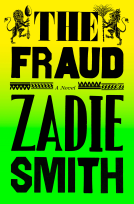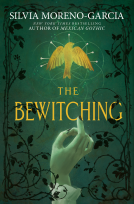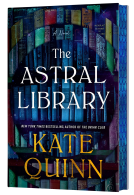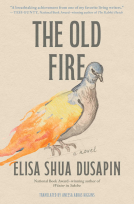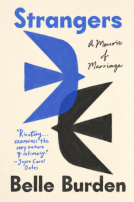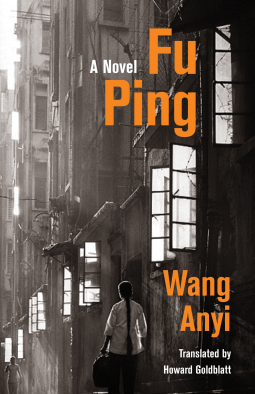
Fu Ping
A Novel
by Anyi Wang
This title was previously available on NetGalley and is now archived.
Send NetGalley books directly to your Kindle or Kindle app
1
To read on a Kindle or Kindle app, please add kindle@netgalley.com as an approved email address to receive files in your Amazon account. Click here for step-by-step instructions.
2
Also find your Kindle email address within your Amazon account, and enter it here.
Pub Date Aug 06 2019 | Archive Date Nov 19 2019
Talking about this book? Use #FuPing #NetGalley. More hashtag tips!
Description
Fu Ping is a keenly observed portrait of the lives of lower-class women in Shanghai in the early years of the People’s Republic of China. Wang Anyi, one of contemporary China’s most acclaimed authors, explores the daily lives of migrants from rural areas and other people on the margins of urban life. In shifting perspectives rich in detail and psychological insight, she sketches their aspirations, their fears, and the subtle ties that bind them together. In Howard Goldblatt’s masterful translation, Fu Ping reveals Wang Anyi’s precise renderings of history, class, and the human heart.
Advance Praise
Praise for the author:
“Wang Anyi is one of the most critically acclaimed writers in the Chinese-speaking world.”
—Francine Prose, New York Times Book Review
Praise for the author:
“Wang Anyi is one of the most critically acclaimed writers in the Chinese-speaking world.”
—Francine Prose, New York Times Book Review
Available Editions
| EDITION | Other Format |
| ISBN | 9780231193238 |
| PRICE | $24.00 (USD) |
Average rating from 23 members
Featured Reviews
Good book. The only thing was I could not truly concentrate on reading due to format of the book. Otherwise, well written plot. The book takes you thought the journey of Asian world and its struggles. Plot 4/5 for me.
 Elyse W, Reviewer
Elyse W, Reviewer
I really wanted to read this...
There is some great intimacy within the storytelling- and I was interested in the topic.
But the distraction of the translation was difficult.
It’s too hard to read a book this way -
I can’t recommend the way it’s translated.
But thank you sooo much for the opportunity to try!
Wishing much success to the author.
 Greg Y, Reviewer
Greg Y, Reviewer
Fu Ping is an orphaned village girl who has been promised in marriage to a young man she has never met. She travels to Shanghai to be with the boy's grandmother. As she is immersed in the big city and meets people from walks of life she has never encountered, Fu Ping grows to be more independent and assertive, casting doubt on the plans for her future.
The great strength of this novel is how vividly Wang Anyi describes life in the back alleys and shanty towns of Shanghai. As Fu Ping encounters the unfamiliar, the reader is also taken to places and lifestyles that have mostly passed into history. I was particularly impressed with her accounts of the lives of the river folk, and of the impact of the annual flood of the river, which reminded me in some ways of Bleak House and Our Mutual Friend.
 Annie S, Librarian
Annie S, Librarian
So many works of historical fiction revolve around the limited roles women had for, well, most of recorded history. In fiction, we see women break through these limits to find careers or true love or adventure, etc In Wang Anyi’s Fu Ping (translated by Howard Goldblatt), we are presented with a similar scenario. The titular character, Fu Ping, has traveled to Shanghai from her village after sort of making a deal to marry a young man. She doesn’t particularly want to marry him. She doesn’t particularly want to marry anyone. She would, as the Scrivener said, “prefer not to.”
Fu Ping is an orphan with few options in mid-twentieth century China. Her parents died when she was young. Relatives took her in, but they were not particularly loving. She was maid/nanny/laundress/odd job woman around the house. It’s little wonder that she takes an offer from a woman called Nainai to marry her adopted grandson. Until the arrangement can be formalized, Fu Ping will live in Shanghai with Nainai, sharing her work as nanny/housekeeper/cook for a well-off family. Fun Ping is quiet, very reluctant to reveal much of herself. The novel conspires with her to keep her personality and history opaque by spending most of its words showing us everything about Nainai, the other servants in their apartment building and neighborhood, a friend of the girls Nainai cares for, and so many others. We see Fu Ping mostly through their eyes. Because Fu Ping doesn’t talk much, all of these other characters ascribe all kinds of feelings and motives to Fu Ping based on her slightest responses. This might be funny if they all weren’t so wrong about her.
So much of Fu Ping revolves around family obligations. Nainai adopts a boy to be her grandson because she wants someone to take care of her when she is too old to work. A neighbor, Taitai, is a formidable matriarch who stage manages the careers and marriages of two generations of her family. (She only stops when one of her grandsons out-stubborns her.) But Fu Ping’s family weren’t well off to give her an education—or even much of a childhood—when she is orphaned. Later in the book, we see that part of Fu Ping’s reluctance to marry is because she doesn’t want to get involved with a sprawling family where everyone is pulling strings. The system of filial piety failed her; why should she prop it up by marrying into a family that only wants her for her ability to work?
In the face of tremendous cultural pressure (politeness is almost weaponized in her world), Fu Ping is quietly, infuriatingly subversive. She avoids questions about a wedding date. She neglects to make plans. She even disappears a couple of times when Nainai and others turn up the heat too much. As is so often the case, I enjoyed Fu Ping and its eponymous protagonist a lot more when I stopped trying to guess what was going to happen or where the book was going to go. (Mysteries have encouraged bad habits.) The more I read, I sympathized with Fu Ping more and more. I wished so much for her that someone would stop making plans for her and just ask Fu Ping what she wants.
On the other hand, I loved right from the beginning the way that Wang recreated mid-century Shanghai. This book is full of rich detail about food, commerce, education, culture, tradition, and even the various accents and dialects Fu Ping hears as she moves around the growing city. More than once, I felt like the book was the closest thing I’ve ever found to a textual time machine. The only issue I had with the book is that it either needed a little more editing or maybe some more careful translating. There are some grammatical errors (possibly proofreading oversights) and some awkward phrases that jarred me.
Fu Ping is one of the least depressing novels I’ve read from a Chinese author. There are some sad moments, but I was so interested in what was going on around Fu Ping that I didn’t feel like I was being pummeled by tragedy the way I did when I read Red Sorghum, by Mo Yan. I also had the highly original puzzle of Fu Ping to figure out. I’m not entirely sure I figured everything out, what with all I don’t know about China and Chinese cultures. I would definitely recommend this book to readers who would like to dip a toe into Chinese literature.
I requested Fu Ping, because I love reading novels focused on Asian history / Asian culture. This particular translation had numbers down the side which was somewhat distracting. That said, the narrative was so authentic. I appreciated the insight the story gave into the lives of women in the early days of the People’s Republic. It reads similarly to a collection of short stories, but I found each story equally intriguing. Thank you to Netgalley for the advanced reader’s copy.
1.5 Stars
This is a book I struggled with. It’s not that it’s a difficult read, I just struggled to understand what it was supposed to be. Part anthropological document, part character sketch, it’s hard to understand exactly what this work of fiction was trying to achieve. It’s more a series of in-depth neighborhood descriptions and historical context descriptions and sketches of lower socioeconomic status stock characters from Shanghai’s post-Civil War. Where it did succeed, is that I learned quite a bit about the experience and environment of rural migrants to Shanghai in the mid 20th century. So, I’d say as a supplement to an academic course, this is probably not bad.
The title character Fu Ping, is a young woman who is brought to the city by her prospective mother-in-law (Nainai), to prepare Fu Ping, for marrying her adopted son. A somewhat wooden character whose psyche and motivations aren’t quite clear, Fu Ping has zero interest in marrying Nainai’s adopted son or anyone for that matter. What does she want? We never quite know. If I was to hazard a guess, I would say maybe “belonging” but then she’s such a flat and unsympathetic character, that if that’s the case, she’s a self-saboteur.
My main issue with this novel is I think the voice in which it’s written. From the author’s note at the beginning, you sense a sort of condescending, top-down approach, a hierarchical way of looking at lower income people who migrated from rural areas to populate the slums of Shanghai in the mid 20th century. All the characters in this novel are presented like a series of one-dimensional sketches, given flaws, but they’re all presented as being somewhat naive, good eggs without any capacity for true villainy. The result of this is that in the same breath that the author describes someone as being a bad guy, the person is giving a redeeming counter quality. So, you end up with characters who are simultaneously oblivious and sharply observant, simultaneously stubborn and agreeable, placid and bad tempered. And it’s like which is it??! Furthermore, there’s not enough of a plot involving these characters for you as a reader to make your own judgements as to the personalities of the characters.
I think this could be an interesting read for someone whose main goal is academic for example, maybe using literature to get some sort of anecdotal narrative insight into the culture and environment of Shanghai slums in the mid 20th century. There is a lot to learn here about that setting and this book presents a series of observations that I suppose are fictionalized and that’s why this is being called a novel. As a novel however, this didn’t really work for me. It is very much a character-based book but then the characters felt very flat and ambiguous and the plot didn’t feel cohesive or strong. This also contains extensive descriptions of the environment in Shanghai slums in the era that could be extremely interesting to an academic reader or history buff but may be less so to the casual reader. Because this book was translated from the original Chinese, I’m not sure to what extent my issues with the language in this book are related to the original words and intentions of the author or which are related to translation or even to my own failings of not understanding the cultural context of the language and syntax. However, this is not my first book translated from Chinese- I tend to enjoy Far East Asian historical fiction which is why I was excited to read this and am pretty disappointed that it didn’t work for me.
I got an advanced reading copy of this book from Columbia University Press through Net Galley in exchange for an honest review!
Essentially many stories about Fu Ping, an orphaned servant woman from Yangzhou in Northeast China. Many regarding her confusing relationship with another servant woman named Nainai, from Shanghai. There are many many characters related to and acquainted with Fu Ping and Nainai detailed, and while many of them are interesting and even funny, I found myself frustrated as I was trying my best to keep them all ordered in mind for an eventual point in the plot (which never came) where all would be revealed and explained and come together neatly.
I would suggest some family org charts to simplify reading. Or just read this as if they're separate essays and don't invest yourself heavily in trying to keep everybody sorted. Fu Ping offers an intriguing look into several aspects of Chinese cultural history including dating, arranged marriage, social castes, and servitude.
 Reviewer 395432
Reviewer 395432
Fu Ping is a fascinating look at daily life in mid-20th century Shanghai. It focuses on the poorer underclasses, mostly recent arrivals from the countryside working either as domestic help or eking out a living any way they can in the city’s shantytowns.
Although this is not a long book, the story is a sprawling one, following numerous characters who are loosely connected in a Six Degrees of Separation way to the titular Fu Ping. Fu Ping herself is a country girl, orphaned and taken in by relatives and about to enter into an arranged marriage. She travels to Shanghai for a lengthy visit with the adoptive grandmother of her intended husband.
Fu Ping is prickly, taciturn, stubborn, stoic and infuriatingly passive at times. Due to her low status, she has few options available to her, but she finds small ways to rebel. Through her bewildered eyes, we see the bustling, chaotic working-class areas of Shanghai. Whether or not Fu Ping will follow through on her marriage is the only real plot driver, but it is never a strong focus as the novel meanders and circles around, introducing us to more denizens of the city.
For the most part I enjoyed this immersion into the Shanghai of 50 years ago, but there were times when the narrative became a bit muddled. We’re also not given access to Fu Ping’s interior thoughts which makes it difficult to really connect to this silent, glowering girl. It’s a sociological, ‘slice-of-life’ novel, concerned with domestic matters rather than political ones; the upheaval sweeping China during this time period (roughly 1940s to 1960s) seems to hardly affect the ‘small folk’. All of this gives Fu Ping something of the flavour of a 19th century novel, one that keeps the reader at a slight emotional distance. 3 stars.
 Juli R, Reviewer
Juli R, Reviewer
Literature is a unique way of giving you an insight into other people's lives. The advice to 'write what you know' may seem trite at this point, but I have always loved the opportunity it has given me to get to understand the world better this way. Thanks to Columbia University Press and NetGalley for providing me with a copy of this book in exchange for an honest review.
As some of you may know, I’ve lived in Shanghai for almost 3 years now. It’s a fascinating city, full of contradictions and surprises, and it’s where I found my cat. It’s also a city that can escape definition, because what do you say of a place filled by 23 million people from all over China and all over the world? I’ve found myself in the past few months looking for books about or set in Shanghai and Fu Ping was one of the first. In this calm and wonderful story, Wang Anyi depicts Shanghai in a way that still feels true, even if the story is set a while back. Here is a city full of people moving quickly from the old to the new, with an older generations not always understanding what drives a younger generation.
Fu Ping is a meandering novel. Technically it is about a young girl, Fu Ping, who is brought to visit Nainai in Shanghai, so the latter can test whether she'd be a suitable bride for her adopted grandson. But Fu Ping does not just focus on Fu Ping or Nainai. Instead it becomes a larger exploration of the lives of working class women in Shanghai in the '60s. In a way, Fu Ping feels more like an assorted group of character sketches. This is what felt truest to me, the asides on each of the people Fu Ping meets while visiting Nainai. Most of these characters are women and many are from outside Shanghai, having traveled to the city to work there as housekeepers and nannies. They send money home to support families in the smaller villages outside the city, but their lives are now very far removed from these villages. We don't get to see everything about these women, which means they remain somehow incomplete, but this almost adds to the feeling that you're moving through the city itself slowly and steadily. You only get the faintest of glimpses at the full lives being lived.
Wang Anyi creates a vivid portrait of a vibrant city, as well as complicated portraits of complicaed people. Fu Ping, for example, is not your everyday main character. She is incredibly passive, recalcitrant and stoic. She is thrust into an environment she has no power in. Anyi doesn't show us much of Fu ping's internal life, but does follow her as she moves through Shanghai. Although it is not directly stated, Anyi hints at how this quiet attitude is Fu Ping's way of observing and learning, while it is also the end result of never truly having a voice. At times it can seem as if Fu Ping is more of a historical record, capturing what live was like in Shanghai during the mid-20th century, without infusing a true plot. And yet I felt very gripped, emotionally, by the story of Fu Ping and the lives of those around her. Howard Goldblatt does a wonderful job at translating and capturing the details of Anyi's narrative. Not everyone will appreciate the translation choice of adding line numbers, but it didn't distract me.
Fu Ping is a very unusual yet very fascinating read. For anyone interested in gathering a glimpse of what Shanghai was and is like, Fu Ping is an excellent starting point.
Very interesting look at the life of working class people of Shanghai in the early years of the people’s republic of China.
Insightful stories into another culture.
 Reviewer 514411
Reviewer 514411
Note: I did not finish the book and therefore, I couldn't give this book a fair review and rating. However, since NetGalley requires its members to submit a rating, I'll use a 5-star rating for every ARC that I DNFed because I believe what didn't work for me might work wonderfully for someone else.
I really enjoyed this book with Fu Ping, Nainai, and other strong characters from China on the early XXth century. It gave a lot of insight about history and culture from another country, while at the same with an entertaining and heart warming story.
Recommend it to all who love to read good books with a solid historical background.
Readers who liked this book also liked:
L.M Montgomery
Children's Fiction, Comics, Graphic Novels, Manga, Teens & YA
Silvia Moreno-Garcia
Historical Fiction, Literary Fiction, Sci Fi & Fantasy
Kate Quinn
General Fiction (Adult), Sci Fi & Fantasy, Women's Fiction




